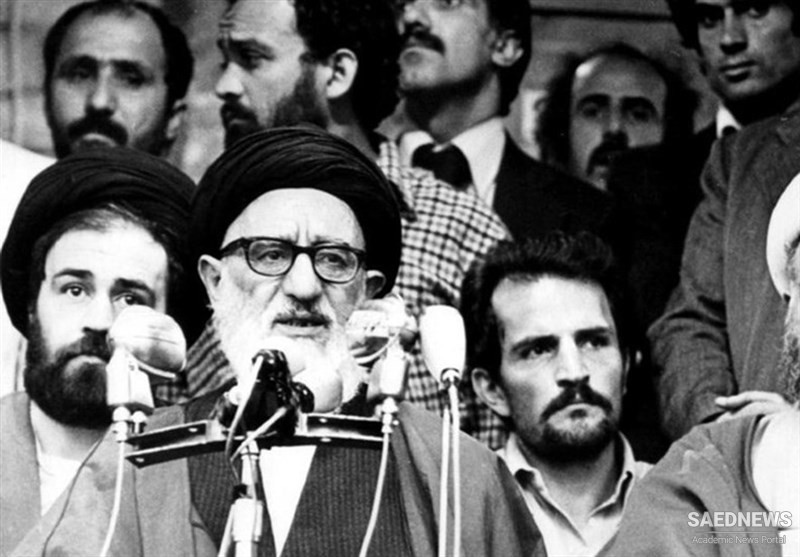Taleqani spent his early life under the dictatorial grip of Reza Shah's reign. He reminisced about his childhood with vivid memories: "Since the early days that I opened my eyes into this society, I saw the people of this land under the whip and boot of the tyrants. Every evening at home we were expecting [bad] news, wondering what had happened that day, who had been arrested, who exiled, who murdered, or what else they had decided for people." But even under the harshest of all conditions, the life of a young cleric had to have its established routines. Sayyid Mahmud Taleqani's education began under his father's tutelage in elementary Persian and Arabic grammar and language and Qur'anic studies. In the early 1930s Taleqani moved from Tehran to Qom, where the late Ayatollah Shaykh Abdolkarim Ha'eri had just established a distinguished seminary on a par with that of Najaf.
Taleqani studied there under a number of prominent jurists: Shaykh Abdolkarim Ha'eri, Muhammad Taqi Khawnsari, Hojjat Kuhkamari, and Muhammad Taqi Yazdi. His years as a seminarian in Qom were spent under the fearful presence of a despotic king determined to give a European look to his country. Reza Shah had established a law in 1928 standardizing the dress code and severely restricting the use of the clerical habit. In 1935 he supplemented this law with another, forcing Iranian women out of their traditional veils, whether they liked it or not. Taleqani remembered those days clearly, with painful memories: When I was a student in Qom, the people of this country lived under severe pressure and tyranny. They would fearfully run from each other. People's lives and dignity, even turbans on the head of the clerics and scarves on women's heads, were subject to the attack and insult of the agents of despotism. This condition caused such pain and aggravation for me, the results of which are torments and sicknesses with which I am afflicted until the end of my days. Taleqani's pain and aggravation with the reign of Reza Shah, the torturous traces of which crept into the most sacrosanct sanctum of his revolutionary imagination, were tacitly translated into mute resentment towards the religious authorities, masters of his own profession, who either condoned or tolerated these deeds. He reached the point of actually questioning the validity and relevance of the entire seminarian system: "In those days [the 1930s]," he reminisced, "I was thinking to myself: 'Aren't these accurate discussions in religious codes and regulations for the individual's actions and prosperity in the society?' His disillusion with the clerical establishment led to a total reappraisal of precisely what Islam, by which he meant Muslim activists, could and should do under the prevailing historical circumstances: This attitude and self-contradiction of certain religious leaders, these dark conditions, these spiritual agonies, inevitably forced me to study and scrutinize ever more diligently the holy Qur'an, the revered Nahj al-Balaghah, the history and biography of the noble Prophet and the sacred Imams, peace be upon them. I became acquainted with certain great clerics. Gradually I found myself in unique surroundings, got to know the roots of religion. My heart reassured, I recognized the purpose and the objective of [my] social responsibility. Then as much as I could, and with the grace of God, I helped others. A certain revolutionary savoir faire gradually develops out of these sentiments that animates the young Taleqani's self-perception. The Herculean attempt to reformulate an Islam more in tune with the historical exigencies of the time, in contradistinction to received doctrines and institutions of authority, is a determination Taleqani shared with Shariati* and other ideologues of the Islamic movement. His attention to the formative pretexts of Islam was the necessary groundwork to reinterpret the old faith into a new revolutionary posture.
Taleqani's growing dissatisfaction with the clerical establishment, and what seemed to him a sanctimonious display of useless piety, would be compensated occasionally by those clerics who did resist Reza Shah's tyranny. One such cleric was his old teacher Shaykh Muhammad Taqi Yazdi who had been tortured in prison. When Taleqani visited him in his exile in Shah Abd al-Azim Shrine, south of Tehran, Yazdi showed him his signs of torture and urged him to keep alive the flame of resistance. 8 From a humiliated biological father to a tortured intellectual father, the paternal weight for revenge was quite heavy on Taleqani. Such distractions aside, Taleqani had to attend to the more compelling requirements of his chosen profession. He completed his formal training in 1939, receiving his ijazeh ("religious degree") from Ayatollah Ha'eri, and returned to Tehran to pursue a long career of political activity. In Tehran he began teaching at Sepahsalar Seminary, which was founded by Mirza Hossein Khan Qazvini Sepahsalar (d. 1880), a distinguished Qajar reformist. As Tehran grew in political importance under the Qajar dynasty, an increasing number of religious scholars were attracted to the capital. Sepahsalar Seminary became the capital's equivalent of the two great seats of religious learning in Iran at Mashhad and Qom. Upon his return to Tehran from Qom, Taleqani founded "The Islamic Institute" (Kanun-e Islam), a religious organization devoted to the political propagation of a revolutionary reading of Islam. The official organ of "The Islamic Institute" was Danesh-amuz, a journal devoted to the propagation of the young activists' ideas. One of the chief activities Taleqani pursued assiduously upon his return from Qom was conducting a sustained course of Qur'anic interpretations. This was a particularly acute political choice because of the innate revolutionary uses to which the sacred Text could be put. Taleqani held the fundamental belief, shared by Shariati*, that the Qur'an had been either completely neglected or totally misinterpreted. He took upon himself the task of reinterpreting the Qur'an as he thought it should be and thus reintroduced the sacred Text to the center of active Muslim political life.


 The Hexagon Shrine of Imam Husayn at Karbala, Iraq
The Hexagon Shrine of Imam Husayn at Karbala, Iraq














































